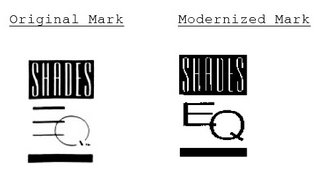Third Circuit Affirms Collateral Estoppel Dismissal Based On TTAB 2(d) Ruling
The U.S. Court of Appeals for the Third Circuit recently affirmed the dismissal of a trademark infringement action, ruling that the district court correctly applied collateral estoppel (issue preclusion) regarding the TTAB's decision on the issue of likelihood of confusion. Jean Alexander Cosmetics, Inc. v. L'Oreal USA, Inc., Appeal No. 05-4321 (3rd Cir. August 14, 2006). The TTAB's conclusion was one of two independently sufficient grounds on which the Board decided the case (the other being priority of use), and the appellate court held that it was proper to apply issue preclusion based upon an independently sufficient alternative finding.
 Jean Alexander, owner of the registered EQ SYSTEMS logo mark shown above for hair care preparations, was the prevailing party in the TTAB cancellation proceeding (decision here). L'Oreal's predecessor-in-interest, Cosmair, had petitioned to cancel the registration based on alleged prior use of the mark SHADES EQ & design for hair care products. In order to prevail, however, Cosmair had to prove priority of use, and it could do so only by tacking together the uses of two different marks (shown below, the earlier mark being on the left).
Jean Alexander, owner of the registered EQ SYSTEMS logo mark shown above for hair care preparations, was the prevailing party in the TTAB cancellation proceeding (decision here). L'Oreal's predecessor-in-interest, Cosmair, had petitioned to cancel the registration based on alleged prior use of the mark SHADES EQ & design for hair care products. In order to prevail, however, Cosmair had to prove priority of use, and it could do so only by tacking together the uses of two different marks (shown below, the earlier mark being on the left).
The Board ruled that the differences between the two Cosmair marks were too substantial to allow tacking, and therefore that Cosmair had failed to prove priority. Alternatively, however, the Board found that even if Cosmair did have priority, there was no likelihood of confusion between the SHADES EQ mark(s) and the EQ SYSTEM mark.
Jean Alexander then filed a trademark infringement complaint against L'Oreal, alleging trademark infringement, and specifically averring likelihood of confusion. The district court dismissed the complaint, holding that collateral estoppel prevented Jean Alexander from re-litigating the issue of likelihood of confusion.
Before the court of appeals, Jean Alexander argued that "it would be unfair to apply issue preclusion here because [it] was the prevailing party in the cancellation proceedings and was therefore unable to appeal the TTAB's favorable finding on likelihood of confusion." The court disagreed, noting that under various precedents Jean Alexander could have appealed the Board's likelihood of confusion finding, even as the prevailing party.
TTABlog comment: An issue that usually arises in these TTAB/court collateral estoppel cases is whether the issue of likelihood of confusion as considered by the Board is really the same as that considered by the court. See, for example, last year's Mayer/Berkshire case, in which the CAFC found that the questions of likelihood of confusion before the TTAB and the court "presented sufficiently different issues and transactional facts to bar the application of preclusion." (TTABlogged here). That distinction did not seem to arise in this case.
Text Copyright John L. Welch 2006.




0 Comments:
Post a Comment
<< Home